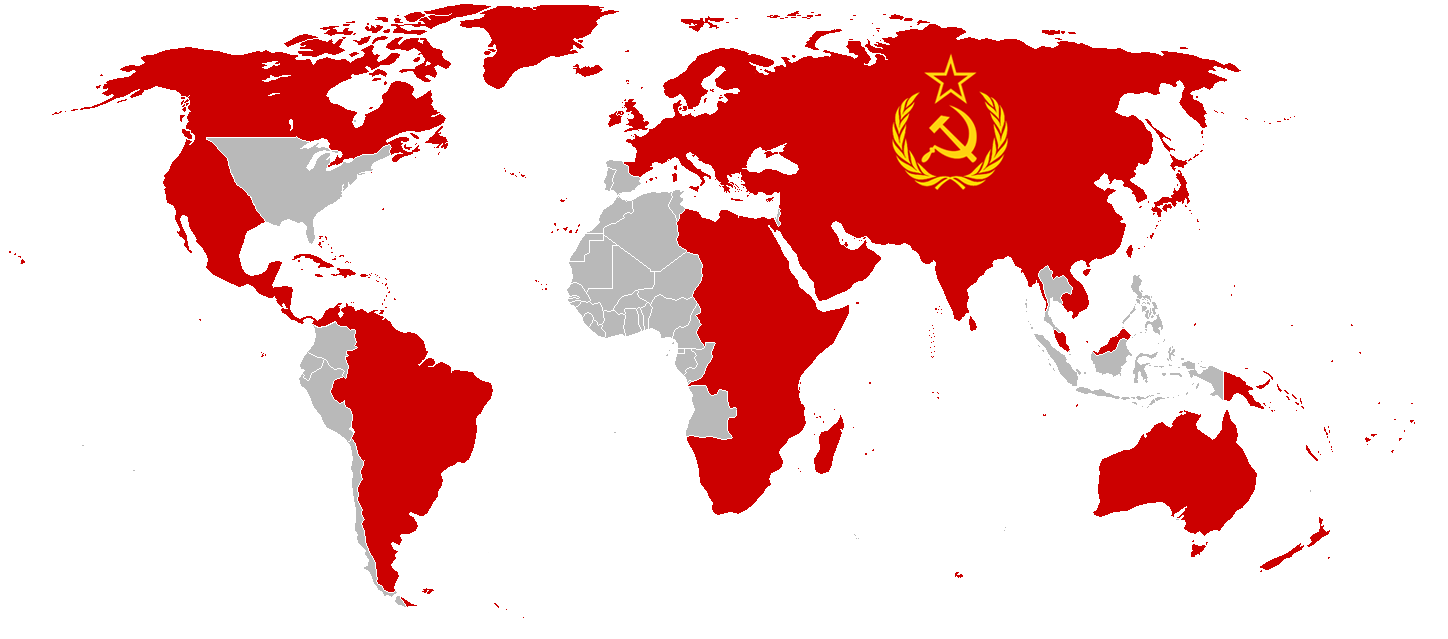I vaguely remember a user debunking this claim but I cannot find that comment and I don’t remember what post it was on.
Russia went from a backwards agrarian society where people travelled by horse and carriage to being the first in space in the span of 40 years. Russia showed incredible growth after the revolution that surpassed the rest of the world:
- https://wid.world/document/soviets-oligarchs-inequality-property-russia-1905-2016/
- https://wid.world/document/appendix-soviets-oligarchs-inequality-property-russia-1905-2016-wid-world-working-paper-201710/
USSR provided free education to all citizens resulting in literacy rising from 33% to 99.9%:
- http://www.revolutionarydemocracy.org/archive/PubEdUSSR.htm
- http://www.revolutionarydemocracy.org/archive/anglosov.htm
- http://unesdoc.unesco.org/images/0000/000013/001300eo.pdf
- https://en.wikipedia.org/wiki/Likbez
USSR doubled life expectancy in just 20 years. A newborn child in 1926-27 had a life expectancy of 44.4 years, up from 32.3 years thirty years before. In 1958-59 the life expectancy for newborns went up to 68.6 years. the Semashko system of the USSR increased lifespan by 50% in 20 years. By the 1960’s, lifespans in the USSR were comparable to those in the USA:
- https://en.wikipedia.org/wiki/Demographics_of_the_Soviet_Union
- https://www.rand.org/pubs/research_briefs/RB5054/index1.html
Quality of nutrition improved after the Soviet revolution, and the last time USSR had a famine was in 1940s. CIA data suggests they ate just as much as Americans after WW2 peroid while having better nutrition:
- https://www.scribd.com/document/430076844/CIA-RDP84B00274R000300150009-5-pdf
- https://artir.files.wordpress.com/2016/05/compar1.png?w=640
USSR moved from 58.5-hour work weeks to 41.6 hour work weeks (-0.36 h/yr) between 1913 and 1960:
USSR averaged 22 days of paid leave in 1986 while USA averaged 7.6 in 1996:
- https://www.ilo.org/public/libdoc/ilo/1994/94B09_66_englp2.pdf
- https://www.bls.gov/news.release/ebs.t05.htm
In 1987, people in the USSR could retire with pension at 55 (female) and 60 (male) while receiving 50% of their wages at a at minimum. Meanwhile, in USA the average retirement age was 62-67 and the average (not median) retiree household in the USA could expect $48k/yr which comes out to 65% of the 74k average (not median) household income in 2016:
- https://www.ilo.org/public/libdoc/ilo/1994/94B09_66_englp2.pdf
- https://www.cbsnews.com/news/could-you-get-by-on-the-average-americans-retirement-income/
GDP took off after socialism was established and then collapsed with the reintroduction of capitalism:
The Soviet Union had the highest physician/patient ratio in the world. USSR had 42 doctors per 10,000 population compared to 24 in Denmark and Sweden, and 19 in US:
-
http://www.sciencedirect.com/science/article/pii/0735675784900482 (sci-hub for access)
-
USSR defeated a smallpox epidemic in a matter of 19 days https://www.rbth.com/history/331857-how-ussr-defeated-black-smallpox
-
The Social Consequences of Soviet Immunization Policies https://www.ucis.pitt.edu/nceeer/1997-812-03g-Hoch.pdf
USSR produced many firsts in the realm of science and technology:
- 1957: First intercontinental ballistic missile R-7 Semyorka
- 1957: First orbiting satellite, Sputnik 1
- 1957: First living in orbit, the dog Laika on Sputnik 2
- 1957: First nuclear powered icebreaker “Lenin” weighing in at 19,240 tons of steel
- 1958: First Tokamak thermonuclear experimental system
- 1959: First man-made object to leave the Earth’s orbit, Luna 1
- 1959: First communication to and from Luna 1 with Earth
- 1959: First object to pass near the moon, and the first object in orbit around the Moon, Luna 1
- 1959: First satellite hit the moon, Luna 2
- 1959: First images of the dark side of the moon, Luna 3
- 1960: First satellite to be launched to Mars, the Marsnik 1
- 1961: First satellite to Venus, Venera 1
- 1961: First person to enter orbit around the Earth, Yuri Gagarin in Vostok 1
- 1961: First person to spend a day in orbit, Gherman Titov – Vostok 2
- 1962: First flight of two astronauts, Vostok 3 and Vostok 4
- 1963: First woman in space, Valentina Tereshkova, Vostok 6
- 1964: First flight of several astronauts, Voskhod 1
- 1965: First spacewalk, Aleksei Leonov, Voskhod 2
- 1965: First probe to another planet Venus, Venera 3
- 1966: First probe to descend on the moon and send from there, Luna 9
- 1966: First probe in lunar orbit, Luna 10
- 1967: First meeting of unmanned Cosmos 186/Cosmos 188, this aws not achieved by US until 2006
- 1969: First docking and crew exchange in orbit, Soyuz 4 and Soyuz 5
- 1970: First signals sent to the moon by Luna 16
- 1970: First mobile robot, Lunokhod 1
- 1970: First data sent by a probe from another planet (Venus), Venera 7
- 1971: First space station, Salyut 1
- 1971: First satellite in orbit around Mars and landing on Mars 2
- 1975: First satellite in orbit around Venus and sending data to earth, Venera 9
- 1984: First woman to walk in space, Svetlana Savitskaja on Salyut 7
- 1986: First team to visit two space stations Salyut and Mir
- 1986: First permanent space station in Earth orbit from 1986 to 2001, MIR
- 1987: First team to spend more than a year aboard Mir, Vladimir Titov and Musa Manarov
These are just some of the biggest technological and social achievements of the Soviet Union.
academic studies on USSR
Professor of Economic History, Robert C. Allen, concludes in his study without the 1917 revolution is directly responsible for rapid growth that made the achievements listed above possilbe:
Study demonstrating the steady increase in quality of life during the Soviet period (including under Stalin). Includes the fact that Soviet life expectancy grew faster than any other nation recorded at the time:
A large study using world bank data analyzing the quality of life in Capitalist vs Socialist countries and finds overwhelmingly at similar levels of development with socialism bringing better quality of life:
This study compared capitalist and socialist countries in measures of the physical quality of life (PQL), taking into account the level of economic development.
This study shows that unprecedented mortality crisis struck Eastern Europe during the 1990s, causing around 7 million excess deaths. The first quantitative analysis of the association between deindustrialization and mortality in Eastern Europe.
So, how do people who lived under communism feel now that they got a taste of capitalism?
-
-
-
-
-
-
Adult mortality increased enormously in Russia and other countries of the former Soviet Union when the Soviet system collapsed 30 years ago. https://archive.ph/9Z12u
-
Former Soviet Countries See More Harm From Breakup https://news.gallup.com/poll/166538/former-soviet-countries-harm-breakup.aspx
The Free market paradise goes East chapters in Blackshirts and Reds details some more results of the transition to capitalism.
There is something that I want to nip in the bud before anybody brings it up. A counterargument that some anticommunists like to repeat is that all of Soviet space exploration was based on the work of Axis scientists, ergo the ‘Mongol hordes’ never really invented anything. I’ve mentioned this before, but I’ll still repeat it:
The remaining Axis scientists that the Soviets did capture still had to live in unglamorous conditions: on some projects the Soviet authorities limited the rôle of the Axis specialists merely to consultation and practical training.
Communism works on paper, but in practice it is hunted down and destroyed by the CIA :V
Name me 2 deindustrialised feudal States that have transitioned to become world superpowers without imperialism and colonisation. uSSR and China.
The USSR went from a semi-feudal backwater that lost WWI and a ton of European territory to winning WWII and putting the first humans in space
Inside of one generation
And then it collapsed due to corruption, central planning and budget deficits.
And were the people of the former USSR better off?
Male life expectancy at birth in Russia fell by six years between 1991 and 1994, from an already-low 63.4 years to 57.4 years over that period, an almost unprecedented decrease in life expectancy in three years.Footnote1 Female life expectancy followed a similar but less extreme pattern, falling from 74.2 to 71.1 years from 1991 to 1994
If your government is better than what came before it and better than what came after it…
Well yes, most former Soviet satellite states went into recession because companies where no longer state funded and had to be profitable and compete on the global market (do you know any good cars, computers or electronics from eastern European countries?), government funding went down in all sectors and taxes went up to get the budget back on track which caused mass unemployment. This happened because the previous government was running a huge deficit, and no other states would agree on any trade deals or credits until the finances where back in order.
Sincerely, someone who was born there long before the 90s.
someone who was born there long before the 90s
Then you must be aware that the vast majority of the people living in the USSR wanted to keep it.
I find it interesting how every single anti-communist was apparently born in the USSR and/or had their family there who all escaped evil persecution.
Every. Single. Goddamn. One. All of them. They always trot out this argument like some kind of gotcha. They do it so much, and so consistently that it honestly makes me doubt the claim at all. 90% of the time you can go through their comment history and notice how they don’t actually talk like a 50-60 year old at all, and in fact talk a lot, lot more like an edgy teenager.
On the other hand, I doubt someone would ever do something horrible like lying on the internet.
“Left to the free market, quality of life plummeted” is not the argument you think it is.
do you know any good cars, computers or electronics from eastern European countries?
Yeah, but under names like Siemens or Renault. When the USSR was illegally overthrown, their assets were sold to capitalist companies for pennies on the dollar, literal looting. They got absorbed and their name destroyed.
The USSR was restoring and editing pictures digitally 3 years before Photoshop was ever released (and the best it had in that department was the clone tool) https://www.youtube.com/watch?v=t2PsiJXswiM
Did Stalin take out a large spoon and eat all of your parent’s grain as well?
Easiest dunk is to show that the West REFUSES to let communism “fail” by itself. If socialism represented a bumbling oaf of a society, it would inevitably stumble and collapse of its own accord. No need for attacking Grenada, Vietnam, Laos with open warfare. No need to assassinate Allende or the many socialist politicians that were killed. No need to send armed forces to stop the Russian Revolution. If socialism was purely set up to fail, we wouldn’t see the PRC rising to become a major world power, etc. I could go on, but basically if it will fail, let it. Obviously the west doesn’t let it because it’s a shitty argument from the start, I GUARANTEE you that nobody (high ranking at least) in the US gov genuinely believes this. Maybe a few dumbass senators or Reps but Foreign Policy advisers, CIA/FBI, they understand that socialism is not going down on its own
Capitalism doesn’t even work on paper or demonstrably in reality.
Oh it works. Just not for the vast majority of people.
Not even then. Even if you look at the billionaires in their doomsday bunkers, their food supply will break down as well at some point after the rest of humanity succumbs to the climate crisis or the ongoing mass extinction event. It is impossible to decouple themselves from the fate of the working class, and the design of their lives is a delusion. Capitalism, no matter how you attempt to modify, reduce, or extend it, is inherently unsustainable in the long run
Sam Bankman Fried wants to buy Nauru to set it up as a doomsday island for his buddies. Not very smart seeing as how it’s probably gonna get hit VERY hard by Climate Change
Are you sure he’s not just building an underwater bunker to escape the feds?
Good one
“They talk about the failures of socialism, well where is the success of capitalism in Asia, Africa, and Latin America?”
deleted by creator
honestly i don’t bother talking with people that come with childish bad faith arguments like that, it’s akin to talking to a lizard.
id try approaching it by asking what exactly do they mean by “works”, like works in what sense?
deleted by creator
deleted by creator
Stalin’s first five year plan changed that for tens of millions as they suddenly had running water, electricity and public schooling/vocational training.
So it worked
deleted by creator
I applaud you for acknowledging the benefits of socialism even though it sounds like you disagree with it overall.
I’d encourage you, though, to think more about what “authoritarian” actually means. All states claim authority to use violence. The only limits states acknowledge on how much violence they can use are the limits they agree to (and therefore can abandon at their convenience). All states sharply respond to certain types of dissent – certainly violent dissent, almost always dissent that (the state claims) is associated with a foreign state, and often even peaceful dissent. This applies to any liberal democracy you can name. Look at how many peaceful protesters the U.S. brutalized in 2020, look at the recent U.K. ruling on sentences for peaceful protesters blocking roads, look at how Germany preemptively bans even discussion of Nazism.
So when Cuba arrests dissenters who are backed by an extremely hostile foreign power, is that any different from what the U.S. would do? When the USSR arrested nationalist dissenters who sympathized with Nazis, is that any different than what Germany does? What actually makes these “authoritarian” countries different from the “good” ones, apart from having the audacity to reject capitalism?
deleted by creator
If you’re here in good faith, I would recommend reading “On Authority.” It isn’t too long, more of a pamphlet than anything else.
https://redsails.org/on-authority/
Capitalist society has tried to fearmonger about vague “Authoritarianism” as long as it has been around. They were calling socialism “authoritarian” before Mao, before Stalin, before any actual socialist state even existed to use as a case study.
deleted by creator
“Good faith” just means being willing to hear us out. Obviously I’d like it if you would change your mind, but as long as you’re trying to understand our point of view(even if you don’t change yours) you’re still welcome here.
My point was that capitalist media of the 1800s was accusing socialism of being “authoritarian” before any socialist nations existed. How could they declare something to be “authoritarian” (or anything for that matter) before it actually existed? Does that not seem like poisoning the well?
And it seems your understanding of these nations comes solely from a western, capitalist country’s interpretation of them and their system. Are their systems “authoritarian” or are they just “different” to the system you live in? Maybe try and read some primary sources on how they structure their system, and listen to what they say about their own system, then weigh what they say about it with what you already know, compare and contrast, that sort of thing. If the only information you get about a nation comes directly from their biggest enemies, of course you’re going to think they’re all horrible.
deleted by creator
Good point but it wouldn’t explain why their literacy rates are higher than even the West who have been industrialized and given every advantage
deleted by creator
I think the implied question is how they started behind the advanced capitalist nations and came to rival or better them. Part of the literacy drive in China, for example was to shift from traditional to simplified characters. I’m actually curious as to whether any other (capitalist) country has done or could do anything similar. And whether this could be achieved without exercising state authority.
deleted by creator
There is no magical literacy equilibrium.
deleted by creator
There’s nothing to debunk because the claim itself is based on an absurd level of ignorance, they don’t even know what they mean by the word communism, and it makes no sense for it to be “tried”. The only consistent references that could almost make sense are these
-
Communism as a theoretical state of being (classless etc society) posed by
meMarx (and some others) as the eventual project and outcome of the dictatorship of the proletariat. As such, it has never been “tried”, it can’t be “tried”, it is more of a goal or state of being rather than a strategy you can adopt. Plus, that project requires that the capitalist class be deposed by the working class such that efforts in that direction could be enacted, which unfortunately has been limited by the extreme and violent reactions of imperialists. It’s difficult to do that project when you’re just trying to survive the sanctions and wars. -
Communism as in a country run by a communist party. This has been tried, and to great success, with fantastic improvements in quality of life for those living there. What failures we do identify largely fall into two buckets: (1) targeted for destruction by imperialists and they were forced to succumb or (2) fell apart through the former and internal failures to build a robust political system, e.g. someone like Gorbachev should never have even been near the reins of power. Both can be criticized, but neither can be chalked up to, “oh dang commies can’t run countries”. Alsi, the largest real economy on the planet is run by a communist party and overcame over a century of colonialism and then industrialization to do it.
But really, someone saying this isn’t even speaking the same language as us. It’s really a conversation between two clueless liberals: one that simplistically craps on “communism” and it “failing” (without pointing to anything concrete) and the other liberal trying to say things like, “well real communism has never been tried”.
In both cases, they’re in need of a basic education, starting with, “what is a communist?”
-
We can debunk it, but that would involve the party making this claim actually having to read, think, and challenge their past assumptions. They may well do that in some contexts, but not when they’re arguing in bad faith and parroting stupid lines like this one.
deleted by creator
Exactly. It’s a thought terminating cliche. For a few other common examples, look at the lib responses in this very thread!
Qui Bono
How is this not a U2 cover band somewhere?
“Well it’s a good thing I live in paper!” /s
To be fair, China literally invented paper :P
deleted by creator
Papyrus or parchment doesn’t count
deleted by creator
It’s a silly argument because it’s basically unfalsifiable. You could lay out the most rational argument for communism and it wouldn’t matter because it’s all just words on paper. It also just kind of ignores the fact that plenty of communist theory has yet to be written. We have to go through a scientific process of experimentation to figure out how to build it. We can hypothesize about how it could work but none of that is set in stone.
Also ignores the fact that the person parroting that quote is not educated on the subject at all.
Universal economic prosperity does require more than communism, just like an engineer must know more than just geometry. But engineers who deny the law of cosines tend to build shitty bridges
Tell them to explain their logic. They will either shut up or double down on more specific, easily debunkable logic.















